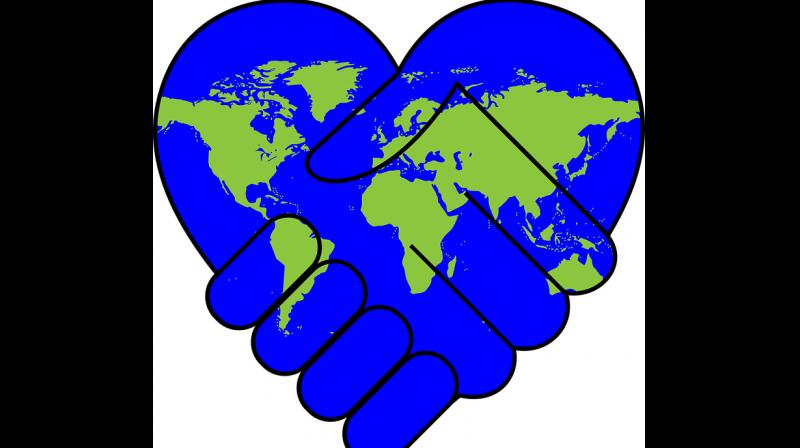Wide Angle: Multiculturalism & Europe Don't forget history
Without migrants from Francophone Africa, there would be no French team which lifted the Cup after 20 long years.

Multiculturalism has been the flavour of the season at the World Cup in Russia, with migrants providing the decisive punch to all European teams which reached the top. Without migrants from Francophone Africa, there would be no French team which lifted the Cup after 20 long years.
An irony attends the Croatian team’s composition. Croatia after all came out of the tribal brutalities of the Bosnian war from 1992 to 1995. It wrenched itself from the multiculturalism of the former Yugoslavia. Was Yugoslavia a melting pot, salad bowl or a series of neighbourhoods patched with chewing gum? Can the wheel come full circle?
Supposing Sefik Ibrahimovic had not migrated from Bosnia to Sweden in 1977, where the great soccer star Zlatan Ibrahimovic was born, could Zlatan have claimed a slot in the Croatian team? Well, his mother, Jurka Gravic, is after all a Croat, confirming without a shadow of doubt that once there was multiculturalism in the Balkans too. Let me share with you the history of its origin. I saw it from very close.
The Bosnian war expanded after German foreign minister Hans-Dietrich Genscher recognised Croatian and Slovenian independence ahead of other EU nations, which were palpitating because German reunification in 1989 had already added to their anxieties.
As the Persian expression goes, “Ek na shud, do shud”. Before one source of anxiety could subside, another surfaced. Cardinal Franjo Kuharic, headquartered in Zagreb’s magnificent cathedral, marched off to the Vatican to seek the support of the Pope and Italy. This was promptly given. Some EU member countries began to have nightmares of the “Axis” being revived.
I was in the cardinal’s office in the cathedral which dominates Zagreb’s main square, when the door of the anteroom was flung open and Father Juraj Jezerinac of the Topusko Catholic Parish walked in. I had been introduced to him at the earliest stages of the conflict in one of the livelier cafes in Zagreb’s square. He was full of stories. One night his orthodox Serb counterpart from the neighbouring church compound came to him, looking very conspiratorial.
He had received word from the Orthodox headquarters in Belgrade that Orthodox priests must lead all Serbs out of Western Croatia in the Topusko region because the Serbian Army was preparing to attack the area and annex it as part of Greater Serbia. This was a scoop.
Was further proof required to confirm coordination between the Catholic and the Orthodox Churches?
Nothing could have exceeded Serbian brutality than the four-year-long siege of Sarajevo. Graphic accounts of this siege, beamed mornings, afternoons, evenings to global audiences, decisively altered the political landscape in Turkey, a development of which the West remained totally oblivious.
Sarajevo derives from Caravan Sarai, pointing to the city’s Ottoman past. The effect of the Bosnian tragedy on the Turkish electorate brought to power Necmettin Erbakan of Refah party, akin to the Muslim Brotherhood. This was anathema to the upholders of Turkey’s secular Kemalist Constitution. The Erbakan government was dismissed.
That is when two of Erbakan’s protégés, Recep Tayyip Erdogan and Abdullah Gul, reinvented themselves as the Justice and Development Party (AKP). The rest is recent history.
The siege of Sarajevo was graphically chronicled by a daily newspaper, Oslobodenje, which won global awards for its bravery. The paper’s office itself was an astounding sight. The offices and the press were in a huge basement, beneath the debris of a multistoreyed building brought down during the war. The editor, Kemal Kurspahic, whom I had met at the last Nonaligned Summit attended by Rajiv Gandhi in Belgrade, looked none the worse for his travails. But he had, nevertheless, developed a mark on his forehead. This happens when the forehead hits the ground for namaz five times a day over months and years.
“Have you become a devout Muslim?” I asked.
“There is no alternative but God when the world abandons you.” There was conviction in his voice.
“Who helped you publish the paper in these circumstances?”
His reply stunned me.
“George Soros.”
Throughout the four-year conflict Europe maintained a hands-off policy to avoid internal divisions within the EU. Observers like Salman Rushdie described European restraint as hypocritical.
“You reverse the religious affiliations of the protagonists on the ground, and not just Nato but even European forces would have entered the theatre immediately to end the bloodbath.” They refrained from intervening because Muslims were the victims.
Those of us involved in covering the conflict knew that Rushdie, and others like him, were speaking the truth. But the mainstream narrative was fudged even on such crimes as the Srebrenica massacres in which 8,000 young Bosnian men were separated from their families and shot dead by Serb militias. Why did the Dutch peacekeeping forces move away from the site of the massacre?
The 78-day US bombing of Serbia during the Kosovo war was designed to oust the Serbian dictator, Slobodan Milosevic. The Russians had been outmaneuvered by the Western alliance in a theatre that Moscow considered as part of its pan-Slavic sphere of influence. Therefore, when the responsibility of various parts of Kosovo was being distributed between the countries of Europe, Russian armoured personnel carriers barged into the area around Pristine airport uninvited. They are still in occupation of that airport. Britain, Germany and France control other segments of Kosovo, a tiny country dotted with exquisite monasteries. The great monastery of Decan is in the care of the Italians, where priests produce the world’s finest wines and schnapps.
Just as the sun sets, a young priest runs around the building carrying on his shoulder a giant rattle called the “tallantone”, alerting the inmates just in case the “Turk invader” has eyes on the “House of God”. This hostile mythology is sustained in many countries on the periphery of what was once the Ottoman Empire. Did someone murmur, “multiculturalism?” For cohesion of the West, a memory of the Crusades has to be kept warm.
H11

